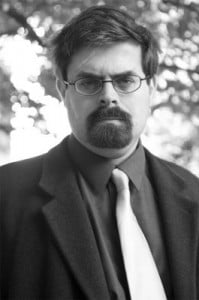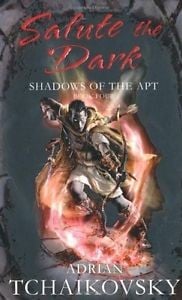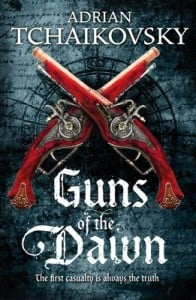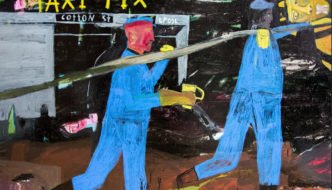Adrian Tchaikovsky: Insect Royalty, Flintlock Fantasy & The End of The World According to Hugh Grant
July 11, 2015
In 2009, I came across a short story in the late lamented Death Ray magazine that was set in a fantasy world where humans had the aspects of various insects and invertebrates such as dragonflies, wasps and spiders. I was enthralled and had to read more. The series was called Shadows of the Apt; the man responsible Adrian Tchaikovsky (or more accurately Czajkowski).

Adrian Tchaikovsky
Six years and ten books later, and here I am in a bar talking to the man responsible. He’s pretty much straight off the train from London and if it was me, sitting down to an interview would be the last thing on my mind, but Adrian is what could be described as ‘industrious’, having had ten books published in less than six years (with Guns of the Dawn and Children of Time released this year, making twelve). He shrugs it off: “When I was writing it, Steven Erickson was three quarters of the way through Malazan Book of The Fallen, and everyone knew that was going to be ten books, and Song of Ice and Fire (George RR Martin) started and that was going to be a big series… So it didn’t seem to be a weird thing to be writing a series of that length. It had an escape pod at the end of book four, where if things weren’t going so well it had a fairly satisfying conclusion and similarly five, six and seven stand on their own fairly well… and then you opt in for the end of the series.”
Having read all ten, I can vouch for that. “One of the things I hope makes it more readable as a series is that every book has its own plot, its own payoff,” he says. “I do have problems as a reader with books where it is just a slice of a larger story.”
I’m still having problems grasping the timescale –surely there must have been some advance work? “It took my quite a while to get published, but not with the first book.” He pauses, possibly to think about how it all happened. “It was my last ditch shot at getting into print, because I’d been at it a long time, so rather than just writing a one off, I wrote what turned out to be the first four books. And only then did I submit it… and in fact that was the thing that just tipped the balance when my agent was trying to sell it. Having four books where they could release two books a year without worrying about having the writer suddenly dry up and stop writing was the selling point they needed. By the time the first one was released, the fifth one was written. I get accused of being prolific a lot, but it’s an optical illusion of sorts.”
It sounds like the road to publication was pretty frustrating. “I was going a bit spare towards the end,” he admits, “you start to get very weird… when all you’re getting are form rejection letters there’s no feedback as to what you’re doing wrong, you start to believe there is a magic formula to getting in… by the time I was waiting on the response to Shadows of the Apt, I was really at my wits end… I basically said if I don’t get anywhere by age 35 I’m gonna chuck it in… I got an agent just before my 35th birthday. Whether I would have gone off and become an accountant…”
That said, he still has a nine to five working for Blacks Solicitors. “Yes.” He pauses briefly. “Unlike a lot of creative professions, one of the blessings of being a writer is you can have a day job as well. It’s often very useful to have a day job, it’s an input of material. Sometimes you see collections of first stories or stories written by very young writers or students – 75% of them are about this guy who’s writing a story – you need life experience.”
Experience wise, Adrian is also a keen LARPer (live action role player) and stage combatant. “I do what’s called historical European martial arts – basically medieval sword training – and I’ve done stage fighting before that and I’ve got a reasonable amateur interest in history so I pick stuff up and it rattles around until I find a use for it.”

Salute the Dark
And find a use for it he did: Shadows of the Apt has some of the most vivid battles written in fantasy. “There are certain things you can only get from experience – having a knowledge of the structure of a fight is useful, and with the live role play stuff I got quite a lot of largeish battles, and as far as the first and second world war thing goes… one of the things I wanted to do with the series was have a fantasy world that developed through its technology so that you get a clash of two technologically proficient warring sides for probably the first time in the history of this world, and so you do get this arms race.”
Progress is usually the catastrophe in fantasy: “[fantasy] is traditionally very conservative, so the only change in the world is that brought about by the villain and the purpose of the heroes is to restore the status quo, whereas the traditional science fiction plot tends to involve actual lasting change in the world, which is the sort of shape of plot I was trying to go for with Shadows of the Apt. You’ve got the Wasp Empire, which is the evil empire, but as the book goes on the empire has to change.”
Adrian’s new book, Guns Of The Dawn, has a more historical feel to it. “It’s set in a secondary world, it doesn’t follow a historical period – there aren’t familiar people walking around, but the setting is very strongly Napoleonic, with maybe bits of the American civil war and the war of independence.”

Guns of the Dawn
Despite this, there is still room for the fantasy element: “It wasn’t a specific decision – there are fantasy elements, but it is a much lower fantasy world … I think the reason was that the story I wanted to tell was more of a historical story and also much more focussed on a single character and their journey. There are at least two non-human races in that world so other stories in that setting might have more fantastical stuff in it as they travel… there’s obviously a certain amount of stuff not seen due to the very small area that the action takes place in.” So could it be the first in a series or just a standalone? “Yes… in that it is a standalone as it works on its own perfectly well, but since writing it I have had ideas about taking the story further, so if it does well enough, I’ll probably write another one.”
As well as Guns, Adrian has a completely non-fantasy novel that came out this summer called Children of Time. “It’s a bit of a departure for me because this is genuine science fiction with spaceships and everything… and science! For which I had to do research. I’m very conscientious when it comes to science fiction… although the stuff I’m trying to present is manifestly completely impossible, I’ve made it as plausible as I humanly can! It wasn’t so much writing science fiction, it was this book – this book demanded to be written. It’s a very bizarre, personal book, I hope people like it.”
“There’s a cast of human characters that live over many centuries by going in and out of hibernation and then you’ve got the things on the planet that live on the planet but are evolving over the time period and building a society. With the human characters you’ve got a very small cast for the whole book – there’s a key crew of about five people, so it’s very close and claustrophobic for them, and then you have generations and generations of the non-humans.” So which came first? “The core idea was the non-human end of it, and I just had an enormous amount of fun trying to work out this plausible non-human civilisation – in a sense, it’s the same kind of game I play with Shadows of the Apt, the way you have similar problems with different solutions, because their technology is different…”
“I consulted with various physicists about time dilation… and that actually helped – and I’m going to mention Four Weddings and a Funeral here, because the reason that works so well is you just skip from event to event. There’s even a bit of religion there and I don’t do religion…”
But the magic in Shadows has a mystical element, doesn’t it? “The magic in Shadows isn’t mystical at all – it’s very practical – and I’ve got a series beginning at the start of next year called the Tiger and The Wolf, which deals with a much lower tech society and has a much more spiritual setting – so that’s bouncing off the Shadow of the Apt and it’s lack of mysticism.”
And that is another book, and as much time as I have with Adrian. I have a feeling that by the time I’ve written this interview up, he may have another one ready to go…
Guns of The Dawn and Children of Time are out now and The Tiger and The Wolf is yet to be announced… but you really have to read Shadows of the Apt…
Rob Wright
For more on Adrian Tchaikovsky visit his website or follow him on Twitter @aptshadow
Buy a copy of Children of Time here




Comments